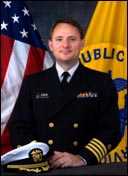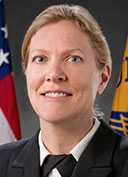CDC, División de Influenza
Office of the Director and Branch Chief Bios

Daniel B. Jernigan, M.D., M.P.H., is the Director of the Influenza Division in the National Center for Immunization and Respiratory Diseases (NCIRD) at CDC. Prior to his appointment, Dr. Jernigan served as Deputy Director of the Influenza Division from 2006 to 2014. He is a captain in the United States Public Health Service, and serves as the Senior Medical Officer and Senior Public Health Service officer for the Influenza Division. As Director, he is responsible for oversight and direction of approximately 320 staff members working to reduce the global burden of disease and death due to seasonal, animal-associated, and pandemic influenza.
Dr. Jernigan received an undergraduate degree from Duke University, a Doctor of Medicine from Baylor College of Medicine, and a Master of Public Health from the University of Texas. He is board-certified in Internal Medicine and has completed an additional residency in Preventive Medicine.
Dr. Jernigan joined the CDC’s Epidemic Intelligence Service in 1994, working in the Respiratory Diseases Branch on the prevention and control of bacterial respiratory pathogens, including Streptococcus pneumonia, Group A Streptococcus, and Legionella. In 1996, he began serving on assignment from NCIRD to the Washington State Health Department as a medical epidemiologist and coordinator of national initiatives to improve surveillance for emerging infectious diseases. Dr. Jernigan became the chief of the Epidemiology Section for CDC’s Division of Healthcare Quality Promotion (DHQP) in 2001. In that role, he supervised numerous investigations and initiatives to characterize various hospital-acquired, device-associated, and antimicrobial-resistant pathogen issues. In 2006, Dr. Jernigan joined the Influenza Division as Deputy Director.
Dr. Jernigan has authored peer-reviewed articles and book chapters on various emerging infectious diseases topics, and has supervised outbreak investigations of viral, bacterial, and fungal infections associated with emerging and antimicrobial-resistant pathogens. He has led epidemiology and surveillance teams for national and international responses, including bioterrorism-related anthrax, the emergence of West Nile virus, SARS, the 2009 H1N1 pandemic influenza, the Ebola response and public health management following natural disasters. During the 2009 H1N1 influenza pandemic, Dr. Jernigan served as the CDC lead for all domestic and international epidemiology and laboratory activities for the U.S. government's response. In 2015, Dr. Jernigan served as the Incident Commander for the CDC's global Ebola response.

Jacqueline Katz, Ph.D. currently serves as the deputy director of the Influenza Division. Dr. Katz earned her Bachelor of Science degree in Microbiology and Biochemistry and her Doctoral degree in Microbiology from the University of Melbourne, Australia. After completing her postdoctoral training in influenza virology, she worked as an assistant member of the Department of Virology and Molecular Biology at St. Jude’s Children’s Research Hospital in Memphis, Tennessee. Dr. Katz joined the CDC in 1992 as chief of the Immunology and Viral Pathogenesis Section in the Influenza Branch within the Division of Viral and Rickettsial Diseases.
Dr. Katz was appointed chief of the Immunology and Pathogenesis Branch of the CDC's Influenza Division in 2006. Under her leadership, the Branch conducted research on the pathogenesis, immunity and transmission of seasonal and pandemic and novel influenza viruses and received three Charles C. Shepard Science Awards for excellence in laboratory methods publications.
During the 2009 H1N1 pandemic, Dr. Katz and her team conducted serologic studies, provided laboratory support for seroepidemiologic investigations and supplied technical support to public health partners. Using existing models systems, her team studied the properties of virulence (disease severity) and transmissibility of pandemic 2009 H1N1 viruses in comparison to seasonal viruses. This research provided a platform for the ongoing assessment of multiple preventive and treatment strategies against pandemic 2009 H1N1 infection.
In addition to her role at the CDC, Dr. Katz has an adjunct appointment at Atlanta's Emory University in the Departments of Microbiology and Immunology, and is an adjunct member of the graduate faculty in the Immunology and Molecular Pathogenesis Program of the Laney Graduate School, Division of Biological and Biomedical Sciences. She also serves as an associate editor for the International Society for Influenza and Other Respiratory Virus Diseases and is a deputy co-chair of the International Society of Influenza and other Respiratory Viruses (isirv). Dr. Katz's work is documented in more than 290 peer-reviewed research articles, reviews and book chapters. In late 2014 Dr. Katz was named the director of the Atlanta World Health Organization (WHO) Collaborating Center for Surveillance, Epidemiology and Control of Influenza. At the same time, she became acting deputy director for the Influenza Division. She served as acting director intermittently during 2014-2015.

Alicia M. Fry M.D., M.P.H., is currently the chief of the Epidemiology and Prevention Branch. Dr. Fry is a captain in the U.S. Public Health Service. The EPB branch is responsible for conducting influenza surveillance, determining influenza disease burden, providing evidence on the effects of influenza vaccine and antiviral agents, vaccine and antiviral use guidance and policies, and outbreak investigations for seasonal influenza viruses, novel influenza A viruses, and pandemics. The branch has both domestic and international activities.
Dr. Fry earned her Doctorate of Medicine from the University of Cincinnati, College of Medicine in Ohio, and trained in Internal Medicine at Johns Hopkins Hospital in Baltimore and Infectious Diseases at University of California, San Francisco. She has a Master of Public Health from the University of California, Berkeley.
Dr. Fry joined the CDC's Epidemic Intelligence Service in 1999, working in the Respiratory Diseases Branch, Division of Bacterial and Mycotic Diseases. She worked as a medical officer in the International Tuberculosis Activities Branch, Divisions of Tuberculosis Elimination; the Outbreak team in the Foodborne and Diarrheal Diseases Branch, Division of Mycotic and Bacterial Diseases; and was team lead for the Respiratory and Enterovirus team, Division of Viral Diseases. She joined the Influenza Division in 2006 and became a team lead in 2012 and Branch chief in 2017.
Dr. Fry’s work is documented in over 180 peer-reviewed research articles, reviews and book chapters.

Joseph Bresee, M.D., FAAP, is currently Influenza Division’s Associate Director of Global Health Affairs. Dr. Bresee is a captain in the U.S. Public Health Service. He also serves as co-Director of the Partnership for Influenza Vaccine Introduction, based at the Task Force for Global Health, which seeks to accelerate the use of flu vaccines in low and middle-income countries through developing public-private partnerships.
El Dr. Bresee se capacitó en Baylor College of Medicine en Houston y completó su residencia pediátrica en Children's Hospital and Medical Center de la Universidad de Washington en Seattle. Dr. Bresee joined CDC in 1993 as an Epidemic Intelligence Service (EIS) officer in the Influenza Branch. From 1995 to 2005, Dr. Bresee first served as a staff epidemiologist and medical officer, specializing in viral gastrointestinal infections and respiratory infections. Subsequently, he was promoted to Epidemiology Team Lead. His research and public health activities focused on rotavirus disease and rotavirus vaccines, and he worked to ensure that rotavirus vaccines were available for children in both the U.S. as well as those living in developing countries.
Dr. Bresee has authored more than 200 peer-reviewed papers and textbook chapters.

Terrence M. Tumpey, Ph.D., serves as the chief of the Immunology and Pathogenesis Branch of the CDC’s Influenza Division. The Immunology and Pathogenesis Branch is internationally renowned for their research on the pathogenesis, immunity and transmission of seasonal and pandemic influenza viruses, specifically in the area of human infection with novel influenza viruses of animal origin. The Branch also provides laboratory support for sero-epidemiological investigations of influenza infections in humans.
Dr. Tumpey earned his Bachelor of Arts degree in biology from the University of Minnesota and his Ph.D. in Microbiology/Immunology from the University of South Alabama School Of Medicine in Mobile, Alabama. He was a recipient of the American Society for Microbiology (ASM) Postdoctoral Fellowship award and conducted his postdoctoral training in the Influenza Branch. He later served the U.S. Department of Agriculture (USDA) as a Microbiologist at the Southeast Poultry Research Laboratory in Athens, Georgia. Dr. Tumpey rejoined the CDC in 2003 and became the Team Leader of Pathogenesis, a position that required him to supervise eight Microbiologists.
Dr. Tumpey's interests lie in elucidating the molecular determinants of virulence and transmission of influenza viruses, including pandemic influenza subtypes. He also contributes to the evaluation of influenza vaccines in a pre-clinical setting. In addition to his role at the CDC, Dr. Tumpey has an adjunct appointment at Atlanta's Emory University in the Department of Microbiology and Molecular Genetics. His research on pathogenesis and immunity during the last 28 years is documented in over 200 total peer-reviewed publications. In 2006, he was honored with the Lancet Award for the top scientific paper of 2005 presented by Lancet. He also received the 2006 and 2008 Charles C. Shepard Awards for Outstanding Research Papers. In 2007, Dr. Tumpey was inducted into the University of Minnesota, Duluth Academy of Science and Engineering and he received the Distinguished Alumni Award presented by the University of South Alabama.

Dr. David Wentworth currently serves as Chief of the Virology, Surveillance, and Diagnosis Branch (VSDB) of the CDC Influenza Division. Dr. Wentworth received a B.S. in Poultry Science, an M.S. in Veterinary Medicine, and a Ph.D. in Virology at the University of Wisconsin-Madison, where he specialized in the study of influenza viruses. He studied coronaviruses as a postdoctoral fellow, and later as an Instructor in the Department of Microbiology at the University of Colorado Health Sciences Center in Denver.
As Chief of VSDB, Dr. Wentworth leads the Influenza Division's efforts to improve global influenza virus control, prevention, pandemic preparedness and response. VSDB's work involves conducting comprehensive antigenic, phenotypic, genetic, and evolutionary characterization of human and animal influenza viruses. Additionally, VSDB's influenza virus efforts include risk assessment of novel viruses, antiviral sensitivity testing, developing diagnostic tests and reagents for national and international use, and training laboratories to perform viral testing in support of the WHO Global Influenza Surveillance and Response System. The data generated and analyzed by VSDB is used to guide vaccine virus selection and the branch generates candidate vaccine viruses for the production of vaccines by manufacturers.
Prior to joining CDC in 2014, Dr. Wentworth was Director of Viral Programs at the J. Craig Venter Institute (JCVI) from 2011 to 2014. His studies focused on interspecies transmission, pathogenesis, viral evolution and vaccine development using a variety of approaches. He directed an NIH/NIAID sponsored viral genome sequencing center at JCVI and also led many other viral genomics projects, including rotavirus, paramyxovirus and filovirus. Dr. Wentworth was the Director of the Influenza Virus and Coronavirus Pathogenesis laboratory at the Wadsworth Center, NYSDOH, and an Assistant Professor at the State University of New York-Albany from 2002 to 2011, where his laboratory studied interspecies transmission of influenza viruses and SARS-Coronavirus, genomic technologies, and experimental vaccine approaches.
He has conducted virological research since 1990 and published over 90 papers and book chapters. His studies have focused on understanding viral evolution, zoonosis, improving molecular virology techniques, identifying molecular determinants that affect the transmission or pathogenesis of viruses, genomics, and combining this information with various bioinformatics approaches to improve vaccines and/or therapeutics to combat these pathogens.

Sonja Olsen, Ph.D., M.S. is currently the Deputy Chief for the Epidemiology and Prevention Branch in CDC’s Influenza Division. She has worked as an epidemiologist in influenza since 2010, first as the Influenza Program Director in Bangkok from 2010 to 2013, then as a member of the Branch assigned to work on the Border Infectious Disease Surveillance in Tucson where she led other projects on seasonal and novel influenza vaccine policy in the United States and vaccine evaluations in Lao PDR. Most recently, she is the principal liaison with partner agencies and institutions based in Washington, D.C.
Dr. Olsen earned her Ph.D. and M.S. degrees in epidemiology from Columbia University. She holds a M.A. in medical anthropology from Case Western Reserve University and a bachelor's degree from Dartmouth College.
Dr. Olsen joined CDC in 1998 as an Epidemic Intelligence Service (EIS) Officer in the Foodborne and Diarrheal Diseases Branch, National Center for Infectious Diseases. From 2001 to 2006, she worked in Bangkok as a key member of CDC's founding team for the first International Emerging Infections Program (IEIP). Her technical expertise and leadership have contributed to an improved understanding of the burden and cost of respiratory disease in Thailand, and helped establish the evidence-base for policy recommendations. She has also assisted in numerous outbreak investigations on emerging infections including SARS, avian influenza and Ebola. During her years in Atlanta, Dr. Olsen led the global expansion of IEIP, and in 2009, she assisted with CDC's domestic and international response to the global influenza pandemic.
Dr. Olsen has published over 130 scientific articles in peer-reviewed journals and frequently presents at international scientific meetings. She is well known both within and beyond CDC for her efforts in enhancing CDC's work as a global public health agency.
Ayuda con los formatos de archivos:
¿Cómo se visualizan los diferentes formatos de archivos (PDF, DOC, PPT, MPEG) en este sitio?- Esta página fue revisada el 2 de febrero de 2016
- Esta página fue modificada el 26 de sep. de 2017
- Fuente del contenido:


 CompartirCompartir
CompartirCompartir